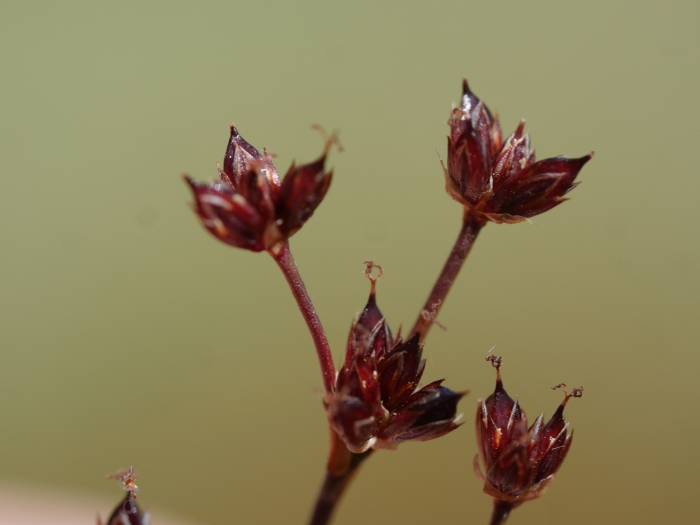Jointleaf Rush
(Juncus articulatus)
Jointleaf Rush (Juncus articulatus)
/
/

Bruce Calvert
CC BY 4.0
Image By:
Bruce Calvert
Recorded By:
Copyright:
CC BY 4.0
Copyright Notice:
Photo by: Bruce Calvert | License Type: CC BY 4.0 | License URL: http://creativecommons.org/licenses/by/4.0/ | Rights Holder: Bruce Calvert | Publisher: iNaturalist | Date Created: 2017-12-12T10:05:10-08:00 |


















































Estimated Native Range
Summary
Juncus articulatus, commonly known as Jointleaf Rush, is an evergreen perennial herb that thrives in a variety of habitats including wet meadows, marshes, stream banks, and lakeshores. It is native to a wide range of regions including North America, Central Asia, Northern Europe, and the Mediterranean. This rush typically grows to a height of 10-50 centimeters and forms dense clumps of cylindrical, jointed stems. The inflorescence is a panicle with several branches, each bearing clusters of 2-12 flowers. The flowers are small, with greenish to dark brown tepals that are 2 to 3 millimeters long, and feature six stamens with anthers, topped by a feathery pistil. The fruit is a dark brown, pointed capsule.
Jointleaf Rush is valued for its ability to stabilize soil and its tolerance of wet conditions, making it suitable for water gardens, rain gardens, and riparian plantings. It is also used for its ornamental grass-like appearance in garden borders and as a ground cover. Jointleaf Rush requires consistent moisture and can grow in a range of soil types, from sandy to clay, as long as the soil is wet. It can tolerate both full sun and part shade. While generally low-maintenance, it can be susceptible to rust and smut diseases.CC BY-SA 4.0
Jointleaf Rush is valued for its ability to stabilize soil and its tolerance of wet conditions, making it suitable for water gardens, rain gardens, and riparian plantings. It is also used for its ornamental grass-like appearance in garden borders and as a ground cover. Jointleaf Rush requires consistent moisture and can grow in a range of soil types, from sandy to clay, as long as the soil is wet. It can tolerate both full sun and part shade. While generally low-maintenance, it can be susceptible to rust and smut diseases.CC BY-SA 4.0
Plant Description
- Plant Type: Herb
- Height: 1.5-2 feet
- Width: 0.5-1 feet
- Growth Rate: Moderate
- Flower Color: N/A
- Flowering Season: Summer
- Leaf Retention: Evergreen
Growth Requirements
- Sun: Full Sun, Part Shade
- Water: High
- Drainage: Fast, Medium, Slow
Common Uses
Bird Garden, Deer Resistant, Low Maintenance
Natural Habitat
Native to wet meadows, marshes, stream banks, and lakeshores
Other Names
Common Names: Joint-Leaf Rush, Jointed Rush, Glanskapslet Siv, Gewöhnliche Glieder-Binse, Glanzfrüchtige Binse, Glieder-Binse, Solmuvihvilä, Jonc À Fruits Luisants, Jonc Articulé, Ryllsiv
Scientific Names: , Juncus articulatus, Juncus polycephalus, Juncus lampocarpus, Juncus lamprocarpus, Juncus articulatus f. articulatus, Juncus turczaninovii, Juncus lampocarpus var. nigritellus, Juncus lampocarpus f. viridans, Juncus supinus var. nigritellus
GBIF Accepted Name: Juncus articulatus L.